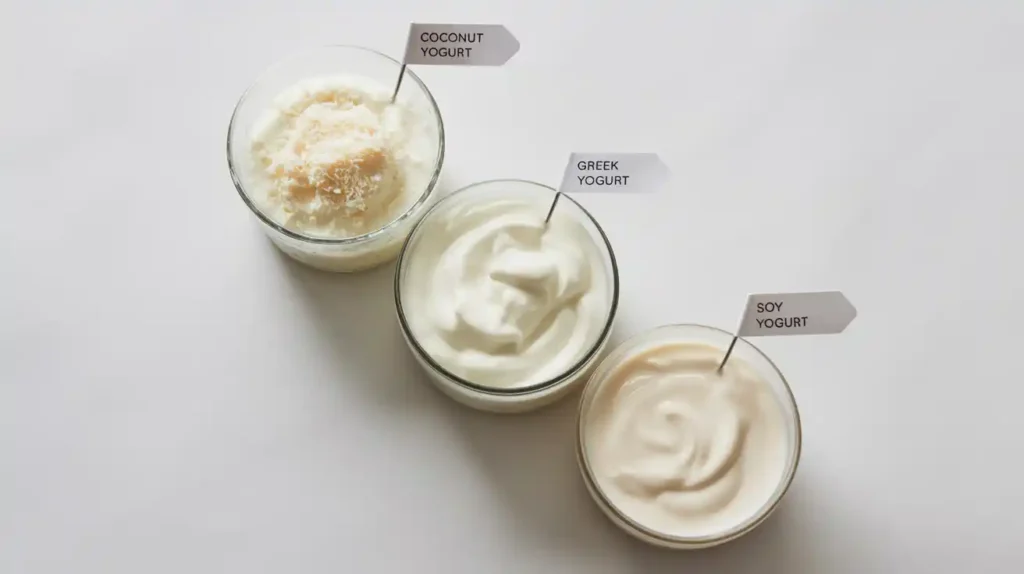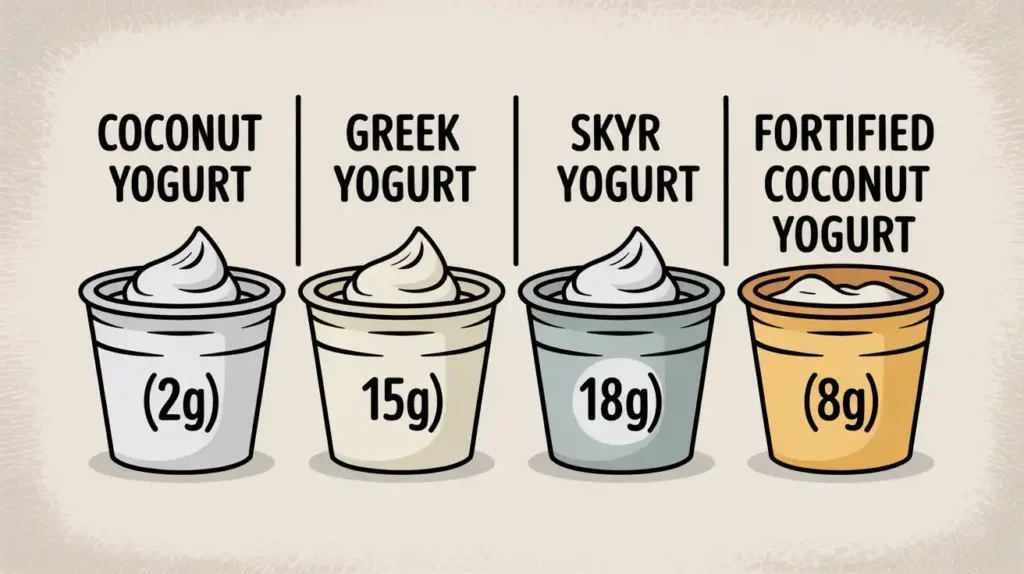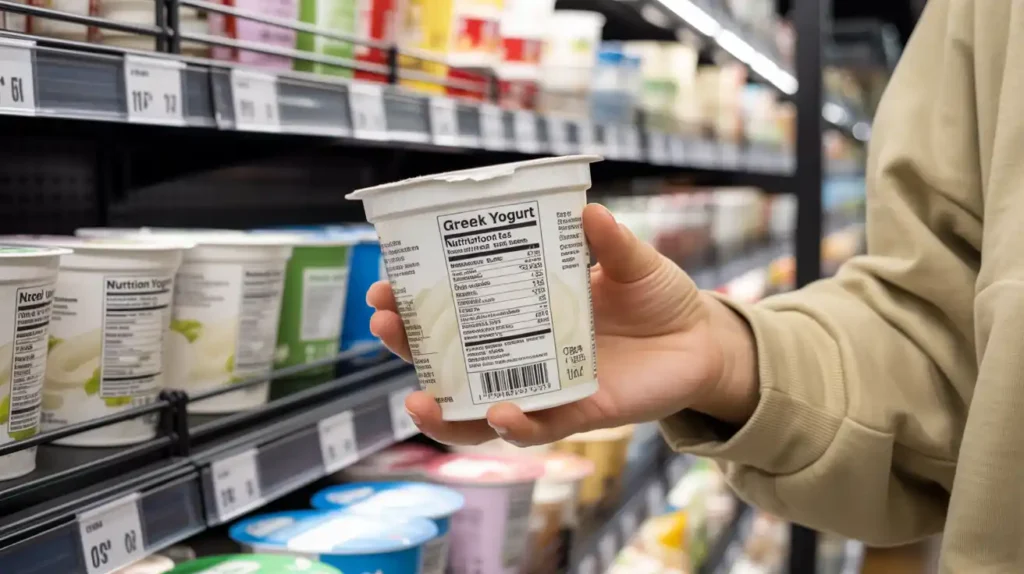Coconut yogurt protein has sparked more interest lately, especially as shoppers look for dairy-free snacks that actually deliver on nutrition. You’ve probably seen those little tubs at the grocery store promising gut-friendly probiotics, dairy-free creaminess, and a “good source of protein.” But if you’ve ever flipped the label hoping for something that could keep you full ’til lunch… well, the numbers might’ve felt a little underwhelming.
As someone who juggles family, work, and real-life energy needs (hello, 2 p.m. slump!), I’m always hunting for shortcuts that are both nourishing and practical. So today, we’re zooming in on coconut yogurt not just as a trendy plant-based snack, but as a potential protein player in your everyday routine.
In this post, we’ll get into:
- How much protein coconut yogurt actually delivers (spoiler: not always a lot… but sometimes, yes!)
- Whether it can truly compete with options like Greek yogurt or high-protein brands like Oikos and Ratio
- And how to choose one that aligns with your energy goals whether that’s steady focus, a post-workout bite, or just not crashing before dinner
Let’s break through the marketing and get to what really matters: is coconut yogurt worth it for your protein game or just another pretty label?
What is Coconut Yogurt and Why Is It Trending?

Coconut yogurt is exactly what it sounds like: yogurt made from coconut milk instead of dairy. It’s usually fermented with live active cultures so it acts like traditional yogurt in some ways but nutritionally? That’s where it gets interesting.
See, coconut milk doesn’t come with much protein on its own. Unlike dairy or even soy it just doesn’t carry that muscle. Some brands try to fix that by adding things like pea protein or faba bean blends, but many versions still hover around 1 to 2 grams per serving. Barely enough to brag about.
So… why all the fuss?
Well, for starters, coconut yogurt checks a lot of modern boxes: dairy-free, gut-friendly, creamy, allergen-friendly. And then there’s the marketing. “Coconut” just sounds healthy, doesn’t it? It gives tropical, clean, wholesome even when the label tells a different story.
That’s why I always flip the container. Because while some of these yogurts really do deliver on protein, others are more about the vibe than the value.
FAQ-style:
Is coconut yogurt considered high in protein?
Not by default. Most coconut yogurts have just 1–2 grams of protein per serving. But some fortified versions especially those with added pea or soy protein can hit 8–10 grams. Always check the label.
Protein in Coconut Yogurt: How Much Are You Really Getting?

Let’s not sugarcoat it: It’s mostly fat, some carbs, and very little else. So when it’s turned into yogurt? That protein gap doesn’t magically close.
Most of the standard coconut yogurts I’ve checked hover around 1 or 2 grams per serving even the fancy ones with all the clean-label buzzwords. Honestly, I’ve seen flavored versions that deliver more sugar than protein.
Now, compare that with:
- Greek yogurt, which clocks in at 12 to 18 grams
- Skyr? Closer to 20 if you’re lucky
- And yeah, there are plant-based yogurts with added protein Silk, Kite Hill, Cocojune but those are the exception, not the rule
Even then, you have to ask: what kind of protein? Pea, soy, faba… they’re not all absorbed equally. And if the label says “10g protein” but it’s stacked with 13g of sugar? That’s not really helping you stay full or fueled.
If you’re eating yogurt to recover after a workout, or even just to coast through a busy afternoon without crashing, the protein has to pull its weight. And to be honest, with most coconut yogurts? It just doesn’t.
When Coconut Yogurt Makes Sense in a Protein-Focused Diet

Okay, so coconut yogurt won’t win any awards for protein. But that doesn’t make it useless.
Sometimes it just… works especially when you’re not relying on it to do all the heavy lifting.
What helps:
- Stirring in a bit of protein powder (I’ve done this with vanilla it’s not terrible)
- Adding hemp seeds, chia, or almond butter for some backup nutrition
- Using it as a creamy topping on a grain bowl or warm lentils (weirdly satisfying)
And then there are those in-between moments mid-morning, post-dinner, 4 p.m. limbo when you’re not super hungry but want something soft, light, and vaguely nourishing.
So yeah, it’s not the star of the show. But in the right setting? It holds its own.
FAQ – What People Are Asking About Coconut Yogurt and Protein

Is coconut yogurt good for you?
It can be depending on what you’re looking for. Most coconut yogurts are dairy-free, easy on digestion, and contain live cultures that support gut health. But some are high in saturated fat or added sugars, and the protein content is usually low unless fortified. Check the label and balance it with the rest of your day.
Is coconut yogurt good for you?
It can be depending on what you’re looking for. Most coconut yogurts are dairy-free, easy on digestion, and contain live cultures that support gut health. But some are high in saturated fat or added sugars, and the protein content is usually low unless fortified. Check the label and balance it with the rest of your day.
Does coconut yogurt have the same probiotics as dairy yogurt?
Sometimes, but not always. Coconut yogurt is often fermented with live active cultures, but not every brand includes the same strains or guarantees high CFU counts. Look for labels that say “live and active cultures” and, ideally, list specific strains like Lactobacillus acidophilus or Bifidobacterium.
Is coconut yogurt anti-inflammatory?
It might be. Coconut contains medium-chain triglycerides (MCTs) which have shown some anti-inflammatory potential in research. Plus, probiotic strains in yogurt in general may support a healthy immune response. That said, more studies are needed, especially on coconut-based varieties.
Which is the healthiest yogurt?
It depends on your goals. If you’re after high protein, Greek or Skyr-style yogurts are hard to beat. If you need something dairy-free and probiotic-rich, a low-sugar coconut yogurt with added protein can be a smart pick. Just be cautious of overly sweetened versions that look healthy but spike your blood sugar.
Final Thoughts: Is Coconut Yogurt Worth It for Protein?
I’ll be honest coconut yogurt has grown on me. It’s cool, creamy, and makes a great late-night fridge grab. There’s something about it that feels like a health move, even when you know it’s not a protein bomb.
But if you’re bankingyeah, maybe not. Most of the time, it just doesn’t bring enough to the table on its own unless it’s specifically amped up with added protein.
Still, I wouldn’t write it off. Used right, it fits. Add a scoop of protein, top it with nuts or seeds, build it into a more complete bowl and suddenly, it works harder.
So no, it’s not the hero. But it doesn’t need to be. It’s a solid supporting act if you know how to cast it.

